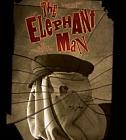The Elephant Man Review 2007
Joseph Carey Merrick had a short and mostly wretched life. Born in Leicester in 1862, he died at the age of 27 in the care of the London Hospital in London's impoverished East End of the early 1890s. Merrick was the victim of an extreme form of neurofibromatosis - a medical condition which causes tumours to grow within the layers of the skin. In Merrick's case, it disfigured his head and back, one of his arms and legs to such a degree that he was initally described by surgeon Frederick Treves as "the most disgusting specimen of humanity that I have ever seen".
In order to survive after being effectively turned out by his family, he eventually allowed showmen to exhibit him as a 'freak'. But as social attitudes changed, human freak shows were banned both here and in Europe, and Merrick found himself robbed and then abandoned by the showman who toured him, and ended up in extreme distress at Liverpool Street Station in London. The only identification found by the police was a card from the surgeon Frederick Treves who had examined Merrick some time before. Treves was sent for, and took Merrick back to the hospital. But because it was not a home for incurables, The London Hospital found itself in a quandary about what to do with Merrick. Because of his appearance - which caused most people to flee from him in terror - the options for where he could be placed were severely limited. And even those institutions designated for incurables had refused to accommodate Merrick.
The Chairman of the London Hospital, one F. C. Carr Gomm, was authorised to write a letter to The Times asking for suggestions. Within days, donations had poured in to the London Hospital to the extent that there was enough cash to house Merrick in a small unused room at the London Hospital for the remainder of his life.
Having a home at last, however, wasn't the end of this incredible story. Merrick became the darling of the aristocracy and upper classes, as well as socialites. They attended him at his small hospital bed-sitting room, frequently bringing him gifts. Merrick was also taken to the theatre and spent some 6 weeks in the country on holiday. These ventures outside the sanctuary of the hospital had to be orchestrated with meticulous diligence in order to avoid Merrick coming into contact with his fellow humans. Amazingly given his disfigurement, Merrick also spent time constructing models, including one of a church which we see him diligently assembling during this play.
There have been numerous books about Merrick's life - my favourite is 'The True History Of The Elephant Man' by Michael Howell and Peter Ford. And John Hurt brought Merrick famously to life in the 1980 black and white film by David Lynch, co-starring John Gielgud as Carr Gom and Anthony Hopkins as Treves.
This play by Bernard Pomerance first came under the spotlight in 1977, opening at the Hampstead Theatre, and won a Tony and several other awards after opening on Broadway in 1979. Pomerance has kept pretty faithfully to what we now know of Merrick's life. There is still some confusion in the play surrounding Merrick's first name which Treves gave as 'John' but his birth certificate states as 'Joseph'. Minor details aside, Pomerance provides a moving piece which, though it demands our sympathy, never approaches maudlin sentimentality.
Unlike John Hurt's portrayal in Lynch's film, there's no attempt here to recreate Merrick's deformities with realistic makeup or prosthetics. What we get from Marc Pickering's finely worked description is simply and successfully achieved through mannerisms, movement and contortion. The only sacrifice that Pickering seems to have made is to have his head shaved.
This is a serious and accomplished cast that more than does justice to both Merrick's story and Pomerance's fine play. Pickering's demanding portrayal is both highly convincing and moving as Merrick, and there's fine support all round from the ensemble who frequently double-up in different roles. I particularly enjoyed Jennifer Taylor's performance as Mrs Kendal, and though I found Ayden Callaghan's Treves a little austere initially, he provides an essential and heart-rending poignancy to the piece when we see tears flowing down his cheeks as he questions his convictions towards the end of the play. However, I thought Leon Bearman looked a little too youthful to provide a totally convincing Carr Gomm - the chairman of the London Hospital - though his confident performance more than made up for any deficiencies in his age.
Studio 2 at Trafalgar Studios is a cosy and intimate space, but it seems a little on the small side for 'The Elephant Man'. Though we benefit from the proximity of the actors, it's a tight squeeze for even the small amount of scenery, so that there are times when the scene changing jarred a little, and interfered with Fabricio Brachetta's evocative and haunting music. Minor niggles aside, this is a fine production which has all the hallmarks of compelling theatre, even if the story itself is almost a 'dream vehicle' - in the wrong hands it could all too easily turn into a nightmare.
Joseph Merrick's life continues to fascinate to this day, and I suspect that fascination will continue for years to come. There's no doubt that it is an overwhelming story of immense human suffering, abuse, and final salvation thanks to largesse, kindness and humanity. However, having been 'gawped at' by both the masses and the well-to-do in his lifetime, it's hard not to think that we're perpetuating that process by 'gawping' still. Though there are obvious lessons to be learnt from a story such as this and there is certainly a need to remember Joseph Merrick and his tragedy, I often feel that there are also exceptionally good reasons why he ought now to be allowed, finally, to rest in peace.
Originally published on
